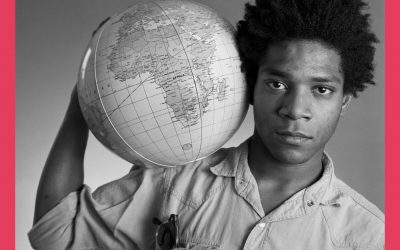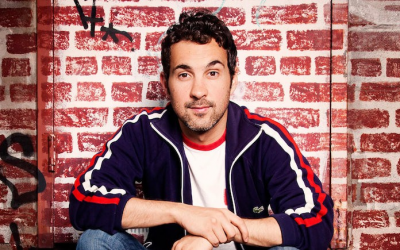In earning his living as a comedy writer, Matt Kirsch has what many would consider to be a dream job. As a staff writer for Triumph’s Election Special 2016, Matt was recently nominated for a Primetime Emmy. Prior to his work with Triumph The Insult Comic Dog, Matt contributed to nearly 300 episodes of the Late Show With David Letterman, writing for Letterman from 2013 through the groundbreaking talk show’s 2015 finale.
Prior to his work on late night television, Matt created Duder. A web series long before Hulu, Netflix and Amazon Prime were creating web-only content, three seasons of Duder were produced. The show was a Webby honoree in 2009 for Best Long Form Comedy and went on to win Best Comedy at the 2011 New York Television Festival. Now based in Los Angeles, the Yale graduate is currently writing for Disjointed, the forthcoming Netflix series starring Kathy Bates and produced by Chuck Lorre.
Downtown caught up with Matt for some Q&A, attempting to learn about the everyday life of an acclaimed comedy writer. Matt can be followed on Twitter via @HeyMattKirsch, while Duder remains posted online at www.duder.com.
I know that you wrote plays and produced an online series before that was a common gig, but what was your first paid writing gig?
Matt Kirsch: I worked for The Onion for about four years and contributed headlines for the paper and story ideas for the IFC show. When The Onion moved to Chicago, the bulk of the editorial staff left, and we started this web project with Adult Swim called Thing X. That was my first official writing gig.
What was the first writing gig you had in which it was clear that this was a career instead of another one-off gig?
MK: Getting the Letterman job was exciting just because it feels like you won the lottery — there’s so much chance and circumstance that goes into hiring for these gigs. But I think getting signed by an agent, which happened about a year before Letterman, strangely made things feel more real for me. Once you have someone working for you and it’s in her best interest for you to get jobs and keep working, it starts to feel more like a career, for better or for worse.
Was there a mentor or someone early on that helped you move forward in your career?
MK: Definitely my playwriting professors in college — Deb Margolin and Toni Dorfman — were hugely influential just in my helping me find my voice and gaining confidence. And there were so many ridiculously talented writers at The Onion that I learned from and helped me out: Joe Randazzo, John Harris, Joe Garden, Chris Karwowski, Carol Kolb, Dan Guterman, and tons others.
Did you always want to be a writer rather than a stand-up or on-screen performer?
MK: Yeah, for the most part. I had a lot of fun acting in my web series, Duder, mostly because I was playing a version of myself, and when you write it, it’s pretty easy to memorize.
What is the hardest part of your job? Is it coming up with material?
MK: One challenging thing is just fighting the urge for your brain to turn off and relax at any point during the work day, because you mostly have to stay in it. One minute you’re pitching story arc ideas, then you have to switch gears and figure out the best line for some guy to say when he’s being chased out of a bathroom, etc.
On the other hand, what is your favorite part of what you do?
MK: I love just being in the room with funny, talented people, riffing and figuring out minutia about story stuff.
Do you feel that there are any misconceptions about life as a writer?
MK: Hmm, not sure what the stereotypes are exactly, but it’s more collaborative and you’re a little more invisible than some people might think, which is what I like about it. You’re all kind of working as a hive mind, but that’s just my experience, lots of shows are different.
Is there an accomplishment that you’re most proud of as a writer?
MK: I’d say my web series Duder, just because I somehow had the drive to make this thing happen for zero money and convince my friends to work with me for zero money. And it became this messy, unfiltered download of my brain at that particular time in my life.
Having written in both New York and Los Angeles writer rooms, is the experience of writing different between those two cities?
MK: Not a ton of difference — we just complain about different things.
It’s sort of a hack question to ask where writers get their ideas from, but in your case, what is your routine like when it comes to getting creative? Do you treat it as a 9-to-5 where you write every day? Are you more based in writing only when inspiration hits?
MK: Yeah, that is a hack question. Jesus, Darren. (laughs) No seriously, you have to be as disciplined as you can and just write all the time, rather than waiting for inspiration to hit. It’s just a muscle that needs to be exercised regularly — and you never know what will come out at any given time and whether it will be useful or not. With that said, my level of discipline definitely differs whether I have a full-time gig or not and how tired I am at the end of the day.
What are you currently working on now?
MK: I’m writing on a new Netflix show called Disjointed, which should be out in June.
When not busy with writing, how do you like to spend your free time?
MK: I like to hike — which is so much easier to do in L.A. than New York — hang out with our dogs, play video games and cards and board games, and that’s it.
Is there anything you miss about living in New York?
MK: Yeah, lots. Bagels mostly. Walking to a bar in less than 25 minutes. Public transit. And lots of people that still out there.
Do you often run into folks from Long Island while out in Los Angeles?
MK: All the time! There are two writers from Long Island just on my staff, and one is actually from Merrick, though he went to Calhoun [High School]. I know, gross. (laughs)
Finally, Matt, any last words for the kids?
MK: My advice would be: Just write a lot of stuff and don’t just write it, produce it. There’s nothing more important than developing your voice and having something you can show people that showcases your voice. And it doesn’t matter if it’s raw and super low-budget.














